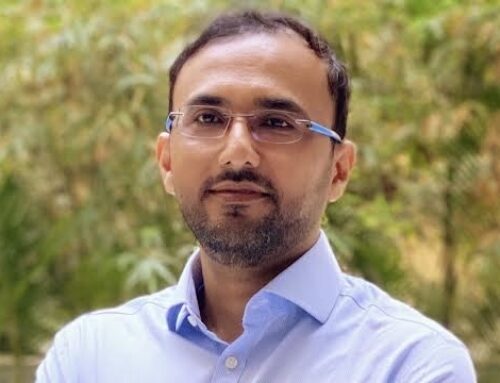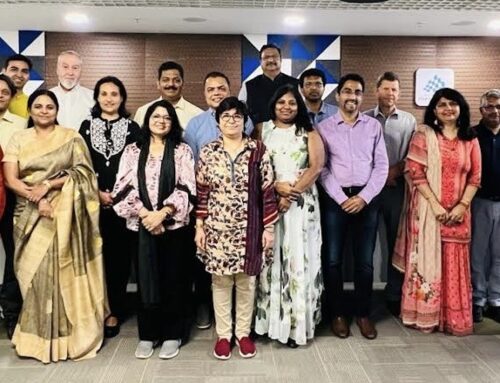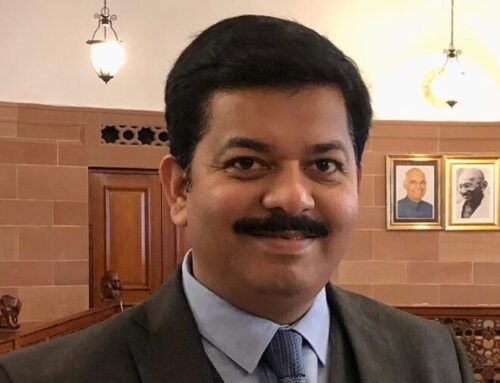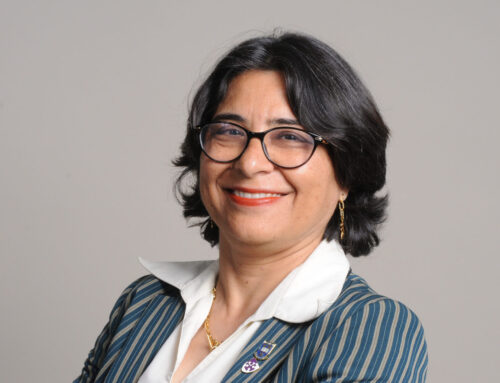John Hoffmire: When I met you in Oxford two years ago, if I remember right, you were working on providing safer drinking water throughout India. Is that still one of your priorities?
Suphiya: You remember right. In India, as in many other parts of the world, water scarcity is considered a major crisis in the 21st century. And fluoride contamination is a major contributor to the world water crisis affecting about 200 million people worldwide.
My research has led to a new, low-cost method to remove harmful fluoride from drinking water with specially made teabag-like pouches. This new method uses pouches covered with nanoparticles synthesized from organically grown jojoba seeds to remove fluoride from water. Jojoba is easily available, and the nanoparticles (iron and aluminum) are taken out as waste byproducts of an oil extraction process from the jojoba seeds. All that one needs to do is dip the special pouch in water and it will remove the fluoride.
Yes, it is still my priority to provide affordable water solutions to the communities and one day make India a country where there is no water with too much fluoride.
John: In the United States, there are some regions that add fluoride to water supplies. How do you find the right balance of fluoride in water?
Suphiya: Fluoride occurs naturally in soil, air, and water as a commonly found element in the earth’s crust. While small amounts of fluoride are necessary for the development of bones and teeth, an excess of it can cause fluorosis, a disease known to cause spotting of the teeth enamel, weak bones, thyroid and kidney problems. Fluoride-contaminated ground water is a serious health issue in several parts of India, as well as in many other countries. The rural populations is more prone to fluoride contamination due to the fact that available techniques for amelioration are not known, unaffordable, or show a lack of user friendliness.
John: In the United States, there are some regions that add fluoride to water supplies if fluoride is less than 1.5 mg/l.
Suphiya: In India, it is often that we have the opposite problem. So, we are changing that with our simple chemo-sensor based pouch dipping approach – which, by the way, is very cost effective — about 3 rupees or about .04 U.S. dollars per pouch per large container of water. This product is portable, requires no water and electricity, and is environment friendly.
John: That’s remarkable! It seems like such a simple solution to a complex problem.
Suphiya: That’s the beauty of science. Sometimes the most effective and elegant solutions are simple.
I should tell you, as well, that the fluoride work is part of my broader interest in phytoremediation – which is the use of higher plants for the cost-effective, environment-friendly rehabilitation of soil and groundwater contaminated by toxic metals and organic compounds. It never ceases to amaze me that the use of green plants can remove or stabilize undesirable substances such as the fluoride ion. There are natural, plant-based, and green solutions to many problems involving pollutants or waste in soil or groundwater.
John: You are currently running the Water Innovation Centre (WIC) in your institution, a project sponsored by the Government of India (DST). Please tell us what you are doing in this project.
Suphiya: This project is a multi-institutional and multi-disciplinary project of 5.65 Crores INR. We are developing Low-Cost Renewable Energy Driven (LC-RED) wastewater treatment solutions for the ceramic and textile industries, wherein groups of scientists from the different streams (like biotechnology, chemistry, physics, mechanical engineering, chemical engineering, and agricultural sciences) are engaged to solve water problems in the above industries in an affordable and innovative manner.
John: In addition to your research, you are also an entrepreneur. Please tell us how your spinoff Drumlins Water Technologies Pvt Ltd originated?
Suphiya: When I started my career in Banasthali Vidyapith seventeen years back, I observed people suffered from dental and skeletal fluorosis despite the fact that many technologies were available to the community through government initiatives. I took this problem as my research question and I always dreamed to solve this problem in a simple and affordable manner. My hope was that our solution would not require complex technical user manuals as it was implemented.
In 2015, our lab came out with a technology that used dipping pouches for the removal of fluoride from tea and potable water. This idea caught wide media attention. To mature this idea, I established the company in 2019. Now it is making progress toward employing many women scientists and making India a place where there is the right amount of fluoride in the water.
Over the years my research projects and spinoff company have created opportunities and employment for more than 15 fellow women scientists and colleagues. That, in itself, has been very rewarding.
John: I noticed you mentioned fellow women scientists and colleagues. Tell me about the women’s university you are affiliated with.
Suphiya: I am an Associate Professor in the Department of Bioscience and Biotechnology at Banasthali University, Rajasthan India. Banasthali Vidyapith is the largest fully residential women’s university in the world. It has played a big role in revolutionizing women’s education in India over the last 80 years. It uses five-fold unique education ideology, which prioritizes the physical, practical, aesthetic, moral and intellectual. It also places a strong emphasis on STEM (Science, Technology, Engineering, and Mathematics and Medicine), combined with a belief in the tremendous role of higher education in empowering women. For me it’s exciting to be a part of a learning ecology that encourages young women to dream big and put their efforts into achieving their dreams in a wide range of fields such as science, arts, engineering, and business. I am very thankful to my university. It has groomed me as a teacher, scientist and bioentrepreneur.
John: Among the many honors and accolades you have received over the years, including recently the 2021 Wonder Women Award in STEM, I want to ask you about being given a fellowship to the Chevening Research Science and Innovation Leadership Programme (CRISP).
Suphiya: That was a tremendous honor and experience. I had an extraordinary time as a CRISP fellow at Oxford University in the spring of 2019. Chevening is the UK government’s international awards programme aimed at developing global leaders. The CRISP programme offers mid-career leaders and influencers from across India and Sri Lanka the opportunity to spend three months at Oxford, researching subject matter, taking in lectures, participating in dynamic training, doing course work, experiencing professional development, and attending cultural events. The British Embassy and High Commission personally select the recipients and our batch was an amazing group. I returned with so many cherished friendships and professional connections that will be with me for the rest of my life. The CRISP opportunity came at right time in my life journey when I was very confused regarding the commercialization of my lab technologies. CRISP has cleared my life path for next ten years. It is the most powerful life changing fellowship. The CRISP fellowship provided mentoring and support which enhanced my perspective, thinking and vision. I will always cherish my beautiful memories of Oxford and the UK throughout the rest of my life.
John: What I’ve enjoyed most in my association with CRISP is getting to know each of the scholars and being so inspired by the great work they are doing. Thank you for catching me up on your work. I wish you continued success with your research and work, and I wish you the best as you continue to be a wonderful role model for young women in India and throughout the world.
Suphiya: Thank you, John, for this interview and for shaping my life. You are unforgettable and a great mentor. Thank you for helping me discover the best version of myself.
Read the entire article here at The Center on Business and Poverty
Suphiya Khan is an Associate Professor at Banasthali University, and founding director at Drumlins Water Technologies Pvt LTD. She was a Chevening Research Science and Innovation Leadership Programme (CRISP) Fellow in 2019.
Interviewer: Dr. John Hoffmire is the Chairman of the Center on Business and Poverty, and Research Associate at the Oxford Centre for Mutual and Co-owned Business.





